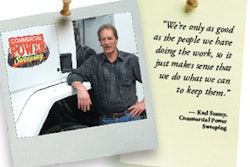A Boeing executive recently told me about one of the best hires he ever made. Among other things, this individual is a terrific coach. As his boss described, "he knows the right answer 95 percent of the time but spends a majority of his time asking questions, not providing answers. This helps everyone else get engaged in the project and in turn create and contribute their own valuable ideas."
Performance Principle: The best coaches know most of the answers but focus their time on asking questions. In this economic environment, we need our strongest people to help everyone else on the team produce better results. If your company is like others with which I work, you have several people who could dramatically increase their value if they learned to be better coaches. How does someone with strong individual ability become an effective coach? Here are some steps:
- You don't have anything to prove. In your specialty, you are an expert and everyone knows it. Stop trying to impress people with what you know. We are already impressed with you. Use your credibility to be a great coach. People want to learn from you because you're an expert; take advantage of the opportunity.
- Ask more questions. The best executives help others to think for themselves. Ask good questions that help people figure out the answers for themselves. If you will start doing more of this, there is no telling how much of a positive impact you will have around your company.
- Do not be patronizing. If others perceive that you look down on them because you know the answers and they do not, you are dead as a coach. If others sense that you respect their intelligence and ability to work out problems for themselves, they will follow you anywhere. You decide which person you want to be.
- Document and share your knowledge. The most valuable people in an organization share their knowledge. If you are willing to put some simple explanations and checklists together on key issues and share them with others, you will be a hero around your place.
- Ask for goals and commitments. Spend the last 15 to 20 minutes of every meeting having people commit to their next actions and completion dates. If you teach people what to do but do not help them set clear deadlines for doing it, you are lecturing not coaching.
- Follow Up. Please do not believe that one terrific coaching session is enough to improve results. 80% of great coaching is in the follow up. Do not end a coaching session without setting a date and time for your next session. Only follow this step if you want to see people produce better results.
- Reject reverse delegation. If you follow the points above, do not allow your people to delegate their work back to you. If people have incomplete or flawed work, point out the mistakes and ask them to fix them themselves.
If you follow these steps, you will help everyone around you to become more effective. That is what I call increasing your value.
Eric Herrenkohl is Founder and President of Herrenkohl Consulting (www.herrenkohlconsulting.com), a management consulting firm focused on creating organizations that drive growth and profits. His work has been published or cited in the Philadelphia Inquirer, Inc.com, Monster.com, Careerbuilder.com, and MSNBC.com. Eric is also the author of Performance Principles, a monthly e-letter that reaches thousands of subscribers across North America and is re-printed in a number of industry and company newsletters.



















